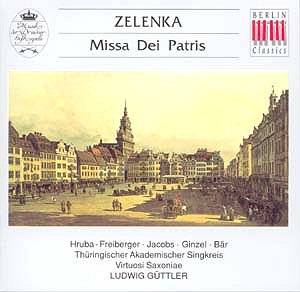Jan Dismas ZELENKA (1679-1745)
Missa Dei Patris ZWV 19 (1740)
Kyrie [8.45]
Gloria [19.41]
Credo [23.55]
Sanctus [7.90]
Agnus Dei [10.37]
 Venceslava Hruba-Freiberger,
soprano Venceslava Hruba-Freiberger,
soprano
René Jacobs, alto
Reinhart Ginzel, tenor
Olaf Bror, bass
Thüringischer Akademischer Singkreis, Wolfgang Unger
Virtuosi Saxoniae/ Ludwig Güttler
 BERLIN CLASSICS BC 1078-2
[69.59] BERLIN CLASSICS BC 1078-2
[69.59] |
 |
| AmazonUK
AmazonUS
Amazon
recommendations |
Jan Dismas Zelenka, born in 1679 in Bohemia, was educated by the Jesuits
in Prague. He joined the Dresden court in 1710 as a double-bass player and
died there, 35 years later, after becoming a composer of sacred music. During
this time, he worked with kapellmeister Johann David Heinichen, and, after
Heinichen's death in 1729, assumed responsibility for church music. This
was, however, temporary, and he was replaced by Johann Adolf Hasse.
While Zelenka was roughly a contemporary of Bach, Vivaldi and Haendel, his
music is not what is generally considered baroque. He was greatly influenced
by Italian opera, very much in favour in the Dresden court. Many similarities
can be heard between his works and those of Hasse, for example, who was a
leading proponent of the opera seria. His late masses, including this
one, show a strong resemblance to Hasse's works.
The Missa Dei Patris was composed for a small instrumental group - two violins,
oboes, viola and basso continuo. Unlike Hasse's final mass, which was a
large-scale work, this is an intimate piece. Yet, structurally and stylistically,
there are many similarities. Like Hasse, Zelenka presents a more dramatic
mass than baroque composers of the same period. The choral movements are
more lively and energetic than those of other baroque composers. The first
movement of the Kyrie, for example, opens with a lively, gay melody before
the chorus enters and starts chanting the text. It almost sounds like a short
opera overture, in its presentation of various musical themes. The Et resurrexit,
part of the Credo, features the four soloists singing together with the chorus,
and, when the soloists sing, their voices express a great deal of drama and
emotion, but remain on a superficial, non-spiritual level.
Zelenka's arias also have the same almost Mozartian feel to them. Some of
them achieve a more meditative effect, such as the Angus Dei I, sung by alto
René Jacobs, which recalls some of Bach's arias in the passions. A
slow, minimal, introspective orchestral accompaniment flows gently behind
Jacobs' plaintive voice. The Benedictus aria, sung by Olaf Bror, even recalls
the Papageno aria of Mozart's Magic Flute.
While the musicians and choir are excellent, the soloists seem a bit weak
and uninvolved. Jacobs, in particular, is quite disappointing - his voice
sounds unconvincing and unfocused.
Nevertheless, Zelenka manages to express a wide variety of musical styles
in this work. This is an excellent recording of a composer whose work deserves
greater attention. In spite of the weak soloists, this is a very agreeable
recording musically.
Kirk McElhearn
CONTACT DETAILS
http://www.edelclassics.com
EDEL/Berlin Classics discs CANNOT yet be ordered directly from the
website. However it is probably worth browsing anyway:
You can try:-
EDEL affiliates in UK and USA:
edel UK ltd.
12, Oval Road
NW1 7DH London
phone: 0044 207 48 24 848
fax: 0044 207 48 24 846
edel America Records, Inc.
1790 Broadway, 7th Floor
New York, NY 10019
phone: 001 212 5419700
fax: 001 212 6648391

